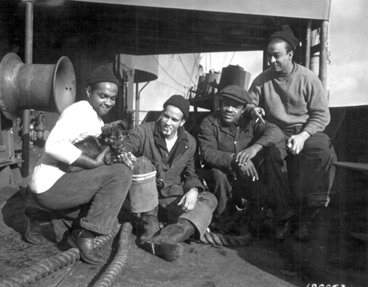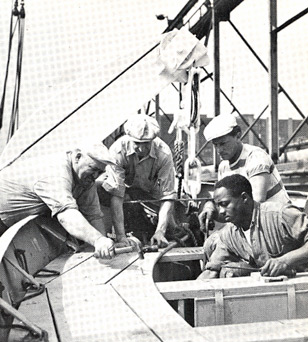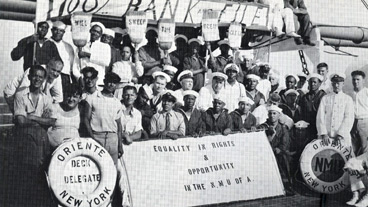Fighting Jim Crow on the High Seas - Did They Really Break the Color Line?
Seamen have been idealized and vilified—portrayed as strong noble workers uniting to stand up for what is right in the face of complacent union officials of ISU and rapacious owners willing to profit from abominable working conditions—or as strong-men duped by Communist Party organizers.
We do know this—the dramatic events of the Fall Strike did indeed result in integrated ships and improved working conditions. Members of Communist Party indeed played a role; racism did not disappear from the maritime industry—but it was dealt a severe blow.
American soldiers who sailed to Europe to fight in World War II in a segregated US Army traveled on integrated troop ships manned by black and white NMU seamen.
African American crew members
 Photograph by Baum, courtesy of United States National Archives, ID# 111-SC-180663.
Photograph by Baum, courtesy of United States National Archives, ID# 111-SC-180663.
Four NMU crew members relax with ship’s mascot “Booker” on the deck of the celebrated SS Booker T. Washington, which boasted the first African American skipper in the modern merchant marine, Hugh Mulzac. US Merchant Marine sailors R. C. Woods, A. M. Mulzac, W. B. Shepard, and S. O’Neil posing with Liberty Ship SS Booker T. Washington’s mascot “Booker,” February 1943.
At Work on Deck
 Photograph from Raskin, On a True Course (1967), courtesy of Tamiment Library, New York University.
Photograph from Raskin, On a True Course (1967), courtesy of Tamiment Library, New York University.
Paul Rosencrantz, recorded in an oral history interview with B Schecter, January 15, 1981 (courtesy of Tamiment Library, New York University):
A ship that I take out of Boston, a freighter in which I am the engine room delegate and a young, very young—not yet 20—engine room seaman, a skilled, very skilled engine room seaman—he’s been going to sea about a year and half. He comes out of Charlestown Prison to go to sea—discovers that he’s going to be sleeping in a room with a black seaman. And he tells me, “I don’t mind working with him, but I’m not going to sleep with him.”
And I tell him he has a choice. He can get off the ship. And if he gets off the ship then he will no longer be a seaman because we will lift his union card. And he will lose his right to sail. And he will go into the army. But otherwise he will be—and this is a very firm policy on the part of our union.
And we’re arguing back and forth. And he’s furious at me. And I keep saying to him, “What’s the matter? Why is it? What’s the basis of your objection?”
But at the same time I’m holding the strong cards. I can be very patient and very gentle talking to him—as long as we understand clearly who’s holding what cards. He loses the argument and decides to sail. And we sail for two months to Italy and back—to Baltimore. And everybody quits but Jimmy and I. The only two people that don’t quit are Jimmy and I. The only reason Jimmy doesn’t quit is because I didn’t quit—because in the course of the two months he thinks I am the repository of every information he can possibly ever want to know. He looks at my books and he says, “When am I going to get a chance to read all those books?” He comes home with me to New York City where I’m at that time living. And he just loves everything I’m doing.
And the story, which is almost unbelievable to Bostonians at this point, but we are sitting in Baltimore still taking on a new crew when a young Baltimore guy comes in and discovers he’s going to be in a room with a black. And he says to us: “I don’t mind working with them, but I’m going to live with them.” And I move away and Jimmy takes over. Jimmy goes into a speech with this guy. And he tells him all the arguments I had, plus some that he had—and God damn it that guy stays on—and it’s Jimmy that carries that fight on from then on.
Two months! Not two years …a trivial amount of time, but the situation being where we have power with which to squeeze—at the same time we are patiently explaining…
African Americans could not join the Sailors Union of the Pacific, the NMU’s West Coast rival, until the late 1950s.
The NMU’s founding convention outlawed racial discrimination, but it took years of struggle—with prejudiced NMU members, as well as prejudiced shipowners—to enforce that policy.
“Equality in Rights and opportunity”
 Photograph from Raskin, On a True Course (1967), courtesy of Tamiment Library, New York University.
Photograph from Raskin, On a True Course (1967), courtesy of Tamiment Library, New York University.
The proudly interracial crew of the SS Oriente celebrate their 100% vote to disaffiliate from the I.S.U. and join the newly formed National Maritime Union of America.


